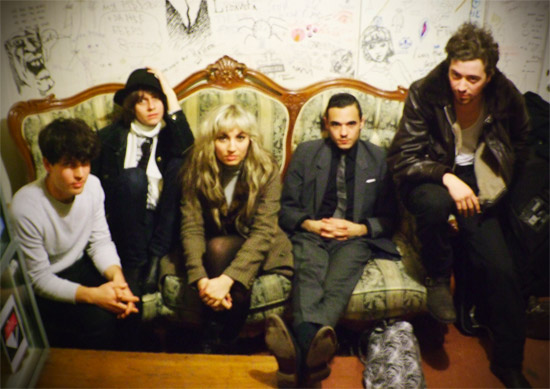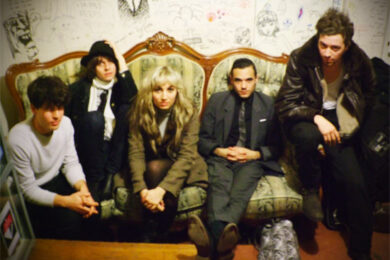"Fucking hell! I couldn’t believe it!" says an incredulous Lindsay Murray. "I was at The Horrors gig in Brixton a few weeks ago and this kid comes up to me – he must have been about 15 or so – and he goes, ‘You’re in The Hypnotic Eye, aren’t you? I really like your band!’ That’s just so mental!"
It’s difficult to shake the feeling that the young guitarist had better get used to the recognition. Since their formation last summer, The Hypnotic Eye have cut a swathe across the capital’s toilet circuit as they’ve increased their following and graduated to more salubrious venues. Barely out of their teens, the band fuses fuzzed-up ramalama with swirling organ washes and the soulful tones of frontwoman Grace Lightman to create a spine tingling variant of psychedelic garage rock.
Listening to their debut single, ‘Marianne’ (lovingly released on 7" vinyl, natch), it’s easy to see why these young rock & rollers caught the attention of The Horrors’ Rhys Webb who, along with his drummer Joe Spurgeon, lent his vocals for the record and held the single’s launch party at his Cave club night in North London. The energy of their live shows is reflected in a work ethic that sees their debut album, The Optical Sound Of The Hypnotic Eye, awaiting release while the band is already busy working on its follow up. The Quietus hooked up with Grace, Lindsay and drummer Will Ritson to find out how things have come together and what they plan to do next…
What is a Hypnotic Eye and how does it relate to you?
Lindsay Murray: It’s a George Blair film from 1960. I heard the name and really liked it so I had to check out the film. And I saw the film, and the opening sequence was just this girl going out and putting what looks like shampoo in her hair – but it’s acid – and then she puts her head in an oven and it catches fire. I thought, ‘If that’s the opening sequence, then I’ve got to name the band after that!’ If that’s what represents the ethos of the band then it’s got to be good.
How did you get together?
Will Ritson: I met Lindsay ages ago when I was about 15 in the Grove Tavern in South Wimbledon, which is the pub at the end of my road, and it’s where all the local bands got their first gigs. Lindsay was this guy who was from out of the way who would drop by every now and then in his fucking weird clothes. The first time I ever saw him play was at a Halloween gig and he turned up in this fucking gnarly Joker-type make-up and a red military coat and I was like, ‘What the hell are you meant to be?’ and he said, ‘I don’t know, but I’ve got to cross London like this to meet my girlfriend!’ But then he started playing guitar and I just thought, ‘This is fucking incredible! He’s some weirdo from an island in Shepperton.’ Years later he comes up to me and says, ‘I’m stealing you from your band to play in my band and there’s nothing you can do about it.’
LM: August Bank Holiday 2011 was the first time we all played together, and the chemistry was instantaneous.
WR: That first day we wrote about eight songs, and now six months later we’ve got an album ready to go. It’s just incredible.
Grace Lightman: My brother went to school with Lindsay and he called me out of the blue and said, ‘Do you sing?’ and I said, ‘Yes, why?’ and he said, ‘I’m doing auditions for a band’. And I’m the only one who had to audition to get into the band!
LM: Grace walked in and starting singing and it was instantaneous. The guys all went, ‘Yeah!’ There was no question about it.
WR: We had another keyboard player but he had to leave the band and this other guy, Ollie, turned up at one of our gigs – the last one with the previous keyboard player – and Lindsay goes, ‘This is our new keyboard player.’
LM: Ollie looks great, he’s got a great ethos, an art history student and an absolute genius. He’s the only keyboard player I’ve ever worked with who listens just to the spaces. At gigs, if he hears other band members filling up the spaces then he’ll instantly change his part. He’s really rhythmically minded. When he joined that’s when things really came together.
GL: It feels so good when we all come together to play.
Your splendid new single, ‘Marianne’, features the vocal talents of The Horrors’ Rhys Webb and Joe Spurgeon. How did they get involved?
LM: We first met properly at the reunion of [60s psych rockers] July, which Rhys put on. I was the first person to turn up – he said he’d save some tickets on the door – and it was completely sold out and he was like, ‘Look, I’ll make sure you can get in, but I’ll have to turn other people away’ and that was all I saw of him that night as he was hiding from loads of ticketless punters. Then it was when Toy started playing their first gigs and they’d just played their gig at [The Horrors’ club night] Cave, and then I met Rhys again when Toy supported The Pretty Things and so we got chatting. We asked him if he’d be interested in shouting ‘Get high!’ on a garage song. Y’know, let’s just be completely blunt with it – and we then bumped into them at the recording studio and he was like, ‘Do you still want us to do that?’
And they were so professional and so keen to get it right. They did it in two takes and it just sounded great! And it was a great learning experience. Having watched The Horrors playing and working together close up, it made me realise that on some level I’d been trying to lead a band which is always the wrong thing to do. Watching them work together – [a band] who I really and truly respect and who are one of the most remarkable bands of our time – it doesn’t feel as if they have a leader; there’s an open forum where everyone can speak and have their own opinion and everyone is free to do what they want to do. I realised that I should change my ethos and step back a bit, especially with recording and mixing and playing live. So now we have five people in The Hypnotic Eye who are all putting their heart and soul into it, and it’s magical.
Your website describes you as ‘flower punk’. How would you define that?
LM: It’s a Frank Zappa phrase that I kind of like. And The Black Lips describe themselves as ‘flower punk’ and it’s sort of like that. It’s almost like this West Coast psychedelia that was being put together, but by people with James Dean haircuts. I like the juxtaposition of two quite disparate things. That’s why I like that band The Human Expression, because they captured both the psychedelic side and the rock & roll garage side without being influenced by the blues and just trying to take music further into their own world.
What is about the 1960s that fascinates you so much and influences your music?
WR: A lot of people have done it and it comes across as a novelty. What we do is write songs that come to us as songs and we play what we want to play. Not everything we do takes from the 60s. But stuff like recording techniques are really interesting and there’s that whole mix of the modern and the old. You can’t escape the time that you live in, but there’s a load of stuff that went on years ago that’s really fucking cool, so it’s a bit of ‘we’ll take some of that and chuck it into what we’re doing now’.
Everyone in the band talks about different things. Y’know, like, ‘That Eric Satie piece was fucking wicked’ and then Grace will come in and say, ‘Yeah, and I’ve got this wicked reggae track’ so we’ve got a lot of stuff going on, while there’s some crazy jazz going on in the background, and that all influences us completely.
LM: For me, that period is interesting because up until 1969 it was really hard to fuck up your records. After then, production techniques came along that made things a little too clean and people stared listening too much to their own recordings.
WR: It was a time when you could be really free as well. You had people like John Coltrane going from the cool jazz of the late 50s and then four years later playing just the most mental stuff. That’s the ethos we’d like to have now.
GL: People get too concerned about the business side of things. We want to make the music that comes to us. Whenever Lindsay comes in with a new song, everyone does what they want to do with it and everything comes so naturally. There’s no thinking about what we’re going to do with it afterwards.
WR: It’s the freedom and fun that came with 60s music that we’re after.
Your debut album, The Optical Sounds Of The Hypnotic Eye, is in the can, and you’ve already started working on your second album. How do you see your sound developing?
WR: A bit broader. The second album we’ve recorded live in the studio.
LM: We want to be more and more free and put more of ourselves into the music.
GL: We were learning a lot as we went along recording the first album and we didn’t relax as much into the songs. With the songs for the second album, we’ve been playing them live and we can feel so much more energy in them.
WR: There’s some really way out there stuff to come on the second album. It’s a lot more raw and darker in places and it’s going to be more in your face and louder.
You’ve released your single on 7" vinyl. Is that an extravagance or an artefact?
LM: It’s really, really important to me to release a physical product and it was really important to me for it to be up to the best standard that it can be. For me, quality is black, durable vinyl. It’s the only source of music that will still be around in 100 years. It’s got soul to it and we’re selling it to far-flung places across the world. Maybe it’s a crazy vision but I can see a kid in about a 100 years time finding our record and putting it on.
WR: Downloads are crap; they just sit on your computer.
GL: Yeah, it’s like they don’t exist, really.
Grace, where does a white girl from South London get such a soulful voice?
GL: I’m half-Jewish and I feel that the Jewish thing has something to do with it. We’re oppressed people, right? I learned to sing by listening to other singers, like really obvious ones like Amy Winehouse and stuff like that, because that’s what was around when I was young. I worked out how to sing and what part of my voice to use. My favourite word is ‘visceral’ and there’s no point in doing anything creative unless it’s from your gut. I have to sing all the time from my gut – even if it’s words that I haven’t written myself – and put my soul into it.
More information on The Hypnotic Eye can be found at their website.



